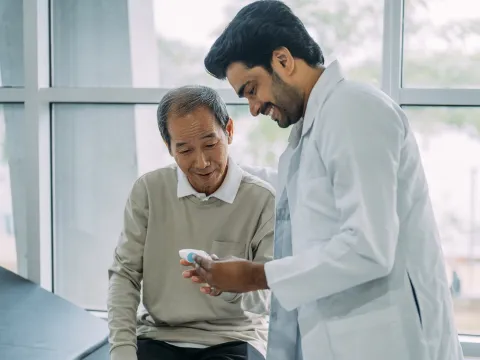- AdventHealth

Choose the health content that’s right for you, and get it delivered right in your inbox.
Have you heard of a serious medical condition that compresses the heart from fluid buildup in the sac surrounding the heart? It’s called cardiac tamponade, and we’re here to give you the facts on this condition. While it is dangerous, having awareness of what it is, its causes, symptoms and treatments is the first step to combatting it and recovering if the need arises.
What is Cardiac Tamponade?
In pericardial tamponade, also known as cardiac tamponade, blood or fluids fill the space between the sac that encases the heart and the heart muscle, which places intense pressure on your heart. The pressure prevents the heart’s ventricles from fully expanding and keeps your heart from functioning properly. Your heart can’t pump enough blood to the rest of your body when this happens. This can lead to organ failure, shock and cardiac arrest, which can be fatal.
There are a couple of different types of cardiac tamponade:
- Acute Cardiac Tamponade: Acute cardiac tamponade occurs when fluid rapidly accumulates in the pericardium, often due to trauma, myocardial rupture, or aortic dissection. The sudden increase in pressure restricts heart function, leading to symptoms like hypotension, tachycardia, and muffled heart sounds.
- Subacute Cardiac Tamponade: In subacute cardiac tamponade, fluid builds up gradually over days or weeks, commonly caused by malignancies, uremia, or chronic inflammatory conditions like lupus. Patients experience progressive symptoms such as shortness of breath, fatigue, and signs of right-sided heart failure like peripheral edema, which can worsen without treatment.
- Low-Pressure (Occult) Cardiac Tamponade: Low-pressure or occult tamponade results from slow fluid accumulation that causes less dramatic hemodynamic changes, often due to hypovolemia or post-surgical conditions. Symptoms are more subtle, including mild hypotension and tachycardia, but the heart’s ability to pump blood is still compromised over time.
- Regional (Localized) Cardiac Tamponade: Regional tamponade refers to localized compression of a specific part of the heart, such as the right atrium or ventricle, often due to post-surgical adhesions or clots. This localized pressure can impair blood flow from the affected region, leading to symptoms that vary depending on the location, such as hypotension and reduced venous return.
Cardiac tamponade is a life-threatening medical emergency. If you or someone you know begins experiencing symptoms, call 911 and get to the nearest ER immediately.
Causes of Cardiac Tamponade
Cardiac tamponade is usually the result of penetration of the pericardium, which is the thin, double-walled sac that surrounds your heart. The cavity around your heart can fill with enough blood or other bodily fluids to compress your heart. As the fluid presses on your heart, less and less blood can enter. Then, less oxygen-rich blood is pumped to the rest of your body. The causes of pericardial penetration or fluid accumulation might include:
- A heart attack
- A ruptured aortic aneurysm
- Accidental perforation
- Blunt trauma to the chest
- Cancer that has spread to the pericardial sac
- Gunshot, puncture or stab wounds
- High levels of radiation to the chest
- Hypothyroidism
- Infections that affect the heart
- Kidney failure
- Lupus
- Pericarditis
Symptoms and Signs of Cardiac Tamponade
If you or someone close to you has the following symptoms, it could be cardiac tamponade:
- Anxiety and restlessness
- Breathing difficulty or taking deep breaths
- Chest pain radiating to your neck, shoulders or back
- Discomfort that’s relieved by sitting or leaning forward
- Fainting, lightheadedness, and loss of consciousness
- Low blood pressure
- Rapid breathing
- Weakness
Remember, don’t wait. Get to your nearest ER as soon as possible.
Diagnosis of Cardiac Tamponade
Diagnosing cardiac tamponade involves a careful assessment by a doctor using a combination of symptoms, physical exams, and imaging tests to quickly identify and treat the condition. Here's how it typically works:
1. Assessing Symptoms and Physical Signs
- Symptoms: People with cardiac tamponade often feel short of breath, tired, or lightheaded, and may have chest discomfort. If someone has a history of trauma, heart surgery, infection, or cancer, doctors might suspect tamponade more readily.
- Physical Exam: Doctors check for key signs, including low blood pressure, swelling in the neck veins (jugular venous distension), and distant or muffled heart sounds. Another clue is pulsus paradoxus, where the blood pressure drops noticeably when the patient breathes in.
2. Imaging to Confirm
- Echocardiogram (Echo): This is the go-to test, using ultrasound to get a real-time view of the heart. It helps doctors see if there’s fluid around the heart and whether the heart chambers are being compressed, making it a fast and reliable way to confirm tamponade.
- Chest X-ray: This can sometimes show an enlarged heart if there's a lot of fluid, but it's not as specific as the echo.
- Electrocardiogram (ECG): This test records the heart’s electrical activity and can show patterns that suggest tamponade, like low voltage or electrical alternans (a variation in heartbeats caused by the heart moving in the pericardial fluid).
3. Monitoring Heart Function
- Cardiac Catheterization: In some cases, doctors may use this test to directly measure pressures in the heart and confirm tamponade. This is more invasive but helps provide detailed information.
- Central Venous Pressure (CVP): Doctors may also measure pressure in the veins to see if it's abnormally high, indicating that blood flow is backing up due to the heart being compressed.
In summary, doctors use a combination of symptoms, imaging, and sometimes special tests to quickly diagnose cardiac tamponade, ensuring that it’s treated swiftly. With prompt intervention, like draining the fluid, most people recover well and feel much better almost immediately!
How is Cardiac Tamponade Treated?
Cardiac tamponade requires hospitalization. The treatment of cardiac tamponade should relieve pressure on your heart and then treat the underlying condition. Initial treatment is your medical team making sure you’re stabilized.
Your doctor will drain the fluid from your pericardial sac with a needle. This procedure is called pericardiocentesis. You may need a more complex procedure called a thoracotomy to drain blood or remove blood clots if you have a penetrating wound. They may remove part of your pericardium to help relieve pressure on your heart.
You’ll also receive oxygen, fluids and medications to increase your blood pressure.
Once the tamponade is under control and your condition stabilizes, your doctor may perform additional tests to determine the underlying cause of your diagnosis.
Recovery from cardiac tamponade largely depends on how quickly it is diagnosed and treated, as well as the underlying cause. Generally, with prompt medical intervention, the outlook is positive, and many people experience significant improvement right away.
Our Heart and Vascular care team is here to care for your whole heart with preventive care, advanced screenings for rapid diagnosis, accredited specialized cardiovascular treatments, expert follow up and life-saving heart care. Learn more here.
Around-the-Clock Emergency Care
Emergencies like a cardiac tamponade are never planned. We hope you never experience such an emergency, but we want you to know we’re here for you 24/7 at convenient locations close to home. Our emergency room physicians and staff are ready to react with urgency, treat with expertise and comfort with compassion. Visit us here to learn more and find your nearest AdventHealth ER location. Our goal is to keep you healthy, safe and whole.



